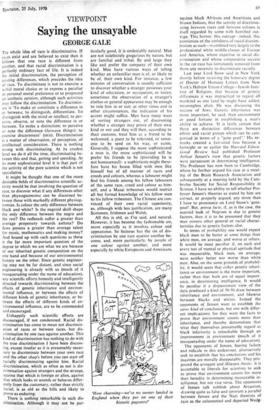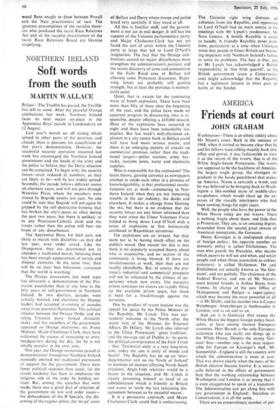VIEWPOINT
Saying the unsayable
GEORGE GALE
The whole idea of race is discriminative. If races exist and are believed to exist then it follows that one race is different from another, and that racial discrimination is a perfectly ordinary fact of life. It is indeed the initial discrimination, the perception of existing differences, which precedes the idea of race. To discriminate is not to exercise a wilful moral choice or to express a peculiar or personal moral preference or to propound an aesthetic opinion, although such activities may follow the discrimination. To discrimin- ate is 'To make or constitute a difference in or between; to distinguish, differentiate. To distinguish with the mind or intellect; to per- ceive, observe, or note the difference in or between. To make a distinction; to perceive or note the difference (between things); to exercise discernment' (oED). Discrimination is a matter of observation, of perception, of intellectual consideration. There is nothing wrong with discriminating. At its crudest level we do it all the time, discriminating be- tween this and that, getting and spending. At its most sophisticated level it is that part of the activity of the pure scientist which is not speculative.
It might be thought that one of the more desirable fields of discriminative scientific ac- tivity would be that involving the question of race, to discover what if any differences other than physiognomonic can be discerned be- tween those with markedly different physiog- nomies. Is colour the only difference between black and white? Is the negroid skull shape the only difference between the negro and the rest? Do redheads suffer a greater than average propensity towards asthma? Do Jews possess a greater than average talent for music, mathematics and making money? And bound up with such questions as these is the far more important question of the degree to which we are what we are because of our inherited genetic composition on the one hand and because of our environmental history on the other. Since genetic engineer- ing may not be far distant, and since social engineering is already with us (much of it masquerading under the name of education), any scientific efforts honestly and intelligently directed towards discriminating between the effects of genetic inheritance and environ- mental influence, or between the effects of different kinds of genetic inheritance, or be- tween the effects of different kinds of en- vironmental influence, are to be commended and encouraged.
Unhappily such scientific efforts are discouraged, if not condemned. Racial dis- crimination has come to mean not discrimin- ation of races or between races, but dis- crimination by one race against another. This kind of discrimination has nothing to.do with the true discrimination I have been discuss- ing, except insofar as it is presumably neces- sary to discriminate between your own race and the other chap's before you can start off racially discriminating against him. Racial discrimination, which as often as not is dis- crimination against strangers and the strange, against that which is foreign or alien, against that which looks or sounds or behaves differ- ently from the customary, rather than strictly racial, is as old as the hills and likely to prove as enduring.
There is nothing remarkable in such dis- crimination. Although it may not be par-
ticularly good, it is undeniably natural. Men are not indefinitely gregarious by nature, but are familial and tribal. By and large they like and prefer the company of their own kind. Men have various ways of telling whether an unfamiliar man is of, or likely to be of, their own kind. For instance, a few minutes of conversation is usually sufficient to discover whether a stranger possesses your kind of education, or occupation, or tastes; sometimes the observation of a stranger's clothes or general appearance may be enough to rule him in or out; at other times and in other circumstances, the indication of his accent might suffice. Men have many ways of sorting strangers out, of discovering whether a stranger may prove of their own kind or not and they will then, according to their customs, treat him as a friend to be welcomed, a guest to be tolerated, or some- one to be sped on his way, or eaten. Generally, I suppose the more sophisticated a man is, the more sophisticated will he prefer his friends to be (providing he is not homosexual): a sophisticate might there- fore have his house filled with men like himself but of all manner of races and creeds and colours, whereas a labourer might find his friends among his fellow labourers of the same race, creed and colour as him- self, and a Masai tribesman would restrict all but formal knowledge of his fellow men to his fellow tribesmen. The Chinese are con- vinced of their own racial superiority, as, although with less justification, are many Scotsmen, Irishmen and Welsh.
All this is old, as I've said, and natural. However, it has become the fashionable sin, more especially as it involves colour and appearance. So heinous has the sin of dis- crimination by one race against another be- come, and, more particularly, by people of one colour against another, and most especially by white Europeans and Americans against black Africans and Americans and brown Indians, that the activity of discrimin- ating between races and between colours is itself regarded by some with horrified out- rage. This horror, this outrage—indeed, this conviction of the sinfulness of racial discrim- ination as such—is confined very largely to the professional white middle-classes of Europe and America, whose expertise in social dis- crimination and whose comparative success in the rat-race has fortunately removed from them any necessity to discriminate racially.
Last year Lord Snow said in New York shortly before receiving the honorary degree of Doctor of Humane Letters from New York's Hebrew Union College—Jewish Insti- tute of Religion, that because of genetic differences it was impractical to regard all mankind as one (and he might have added, meaningless also). He was discussing the success of Jews. Genetic inheritance was more important, he said, than environment or good fortune in establishing a man's ability to achieve. 'It is fairly certain that there are distinctive differences between ethnic and racial groups which can be cate- gorised in terms of a "gene pool".' His re- marks created a fair-sized fuss because a fortnight or so earlier the Harvard Educa- tional Review had published Professor Arthur Jensen's view that genetic factors were paramount in determining intelligence. The Professor has now been to Cambridge, where he further argued his case at a meet- ing of the Brain Research Association and subsequently at a meeting held by the Cam- bridge Society for Social Responsibility in Science. I have no ability to tell whether Pro- fessor Jensen's theories as stated by him are correct, or properly argued, any more than I have to pronounce on Lord Snow's 'gene- pool'. But, prima fade, if, as is the case, the negroid look of Negroes is due to genetic factors, then it is to be presumed that they may possess other general or racial charac- teristics due to genetic factors also.
In terms of probability one would expect black men to be better at some things than white men, on average. and worse at others. It would be most peculiar if, on each and every test of mental or physical aptitude that was measurable, black men, on average, were neither better nor worse than white men. Also, on the same grounds of probabil- ity, it would seem that either genetic inheri- tance or environment is the more important, rather than that both are of equal import- ance, in determining intelligence. It would be peculiar if a dispassionate view of the data produced a kind of 50-50 draw between inheritance and environment, and likewise between blacks and whites. Indeed the opponents of Jensen want to establish the same kind of conclusion, but one with differ- ent implications; for they want the facts to prove that environment counts more than inheritance, and thereby demonstrate that what they themselves presumably regard as black inferiority is remediable through an improvement in environment (much of it masquerading under the name of education).
The opponents of Jensen, fearing failure and ridicule in this endeavour, alternatively seek to establish that his conclusions and his inquiries are morally disreputable. They pro- pound the arrogant and illiterate thesis: it is acceptable to liberals for scientists to seek to prove that environment counts for more than heredity in determining measurable in- telligence, but not vice versa. The opponents of Jensen talk rubbish about Aryanism, drawing quite as false and ignorant a parallel between Jensen and the Nazi theorists of race as the unlamented and departed Wedg-
wood Benn sought to draw between Powell and the Nazi practitioners of race. The ignorant presumptions of the racialist theor- ists who produced the racist Race Relations Act and of the racialist practitioners of the racist Race Relations Board are likewise stupefying.































 Previous page
Previous page